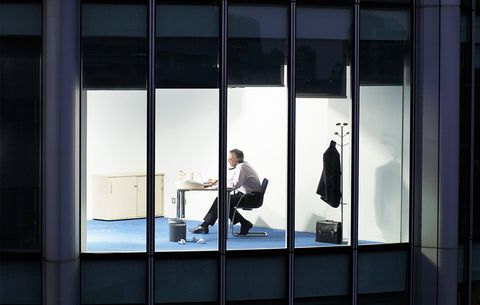Sometimes, work sucks. It’s a sad yet unavoidable fact of life that applies to pretty much everyone in every industry at some point. (With the possible exception of luxury mattress testers.)
But occasional work suckiness (a boring meeting here, a frustrating project there) is one thing. Total work suckiness—the kind that triggers chronic exhaustion, cynicism, and inefficacy—is a whole other. And if you’re experiencing the latter, you may be suffering from a medically-defined condition known as “burnout.”
Yes, it’s an official thing—and a serious one at that. Last May, the World Health Organization (WHO) added “burnout” to its International Classification of Diseases, recognizing the syndrome as the result of “chronic workplace stress that has not been successfully managed.”
Burnout isn’t new, but it is somewhat on the rise, says Michael P. Leiter, PhD, a psychologist and professor at Deakin University in Australia who’s studied the phenomenon for 35 years. Global data is still incomplete, but Leiter estimates that in the healthcare industry (his main field of study), 7-8 percent of folks are burned out, and another 10-15 percent struggle with exhaustion. That doesn’t include people who may be unemployed because of severe cases of burnout.
“I don’t think it’s a reasonable expectation … [that] anybody should be able to adapt to any workplace at any time.”
“There’s a lot about how work is put together that aggravates people towards burnout more than it used to,” he says, including increased busywork and administrative overlay, among other factors. Whatever the origins, burnout is real—and it may be impacting you or someone you know. Here, Leiter explains how to spot a case of burnout and how to alleviate it.
3 signs that you’re suffering from burnout
The WHO’s definition of burnout aligns with the Maslach Burnout Inventory, a leading measure of the syndrome that describes a combination of three factors.
You feel tired—like, really tired—a lot of the time
We all have days where we’re seriously dragging, but hopefully they’re few and far between. If you regularly feel exhausted—especially before the work day even starts—you may be trending towards burnout.
Chronic low energy isn’t a sole indicator of burnout, Leiter says, because you can be exhausted but still fully engaged in work. Or you could be so tired because you’re so engaged. True burnout also bears these two symptoms.
You’ve become seriously cynical
Venting and bitching about work isn’t a crime. Honestly, it would be weird if you weren’t a little salty from time to time. But if cynicism becomes a “regular part of who you are,” as Leiter says, and “you’ve lost the spark that used to be the driving force of your work,” you could be on the path to burnout—or already there.
You’re not as productive—or confident—as usual
The third component of burnout is inefficacy, or an inability to effectively accomplish your work. Instead of feeling capable, fulfilled, valued, and proud, you feel discouraged and unconfident. Mix in some exhaustion and cynicism, and burnout is all but guaranteed.
Getty Images
What to do if you’re burned out
You don’t need to have a full-blown case of burnout before you can correct course. In fact, it’s better—and easier—to treat burnout in its early stages, says Leiter. Here’s how he suggests you can try to steer back towards a healthier path.
Try job crafting
Sometimes, quitting a job is the best solve for burnout. But that’s a big decision that brings uncertainty and disrupts your life, so before jumping to that extreme, try improving your current situation through what’s called “job crafting.”
First pinpoint the interactions, projects, meetings, etc. in a typical workday that you really enjoy, and those that you don’t. Then, adjust your schedule so you spend more time on the good stuff and less time on the bad. With job crafting, Leiter says, “you’ve often got more latitude than you think you do.”
Prioritize sleep
“Exhaustion can compound on itself,” says Leiter. “So sleep is the most direct part of your personal life that impacts burnout.” Fatigue makes doing your job harder, which leaves you feeling discouraged and overwhelmed. When you’re well rested, you’re more excited and confident about accomplishing tasks. So plan your schedule around getting adequate shut-eye.
Intentionally disengage from work
Regularly make time for relationships and activities you enjoy that have nothing to do with your job. Even better if the activities are good for your health, like exercising and spending time outside and away from screens, says Leiter.
“It’s hard to climb out by yourself.”
Let yourself off the hook
Rather than viewing burnout as a personal failing, reframe it as a relationship problem between you and your work. “I do not see workplaces as perfect entities where anybody should be able to adapt to any workplace at any time,” Leiter says. “I don’t think that’s a reasonable expectation.”
What is realistic: acknowledging that some of your burnout is because you and your job simply aren’t a good match. Change from both sides is likely needed to remedy the situation.
Spread positive vibes
If a problematic workplace culture is contributing to your burnout, recruit an office mate to try modeling more positive, genial behavior together. The hope here is that your actions spur a ripple effect that improves conditions for you and others.
Seek professional help
If you’ve tried the above tactics to no avail, it may be time to take an extended break from work, switch jobs, and/or speak with a mental health professional. “It’s hard to climb out by yourself,” says Leiter. Don’t suffer in silence. Take charge of your health and ask for help. After all, no job should suck that much. (With the possible exception of high-powered vacuum tester.)
Source: Read Full Article

